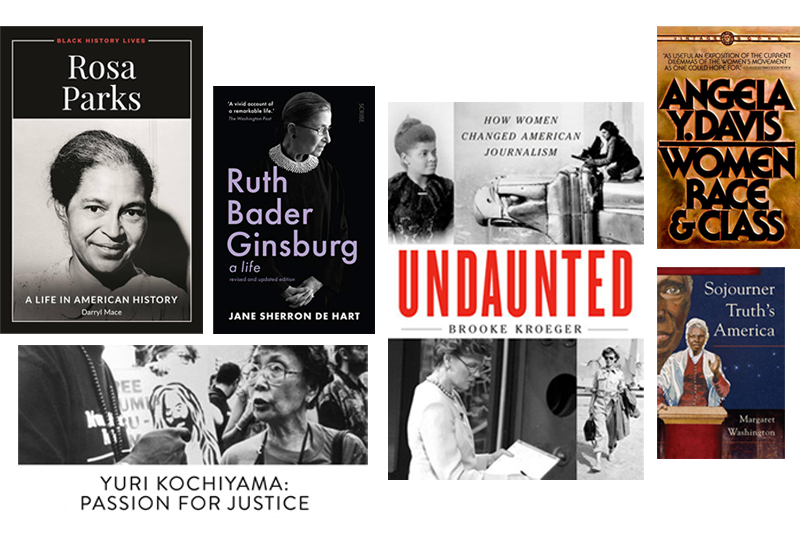University Libraries

March for Women’s History
By Diane Osman
Each year since 1988, the month of March is dedicated to honor and celebrate women’s contributions to American history, culture and society.
Known as Women’s History Month, the commemoration began in 1978 as a weeklong celebration in Santa Rosa, California, planned by the education task force of the Sonoma County Commission on the Status of Women. The effort, led by Molly Murphy MacGregor, a history teacher, was planned for the week of March 8 to coincide with International Women’s Day.
The following year, other communities across the country hosted Women’s History Week celebrations. In 1980, groups of historians and women’s activists united to lobby for a National Women’s History Week. Their efforts were successful: In February 1980, President Jimmy Carter issued a presidential statement declaring the week of March 2–8, 1980, as National Women’s History Week: “From the first settlers who came to our shores … men and women have worked together to build this nation. Too often the women were unsung, and sometimes their contributions went unnoticed. But the achievements, leadership, courage, strength, and love of the women who built America were as vital as that of the men whose names we know so well.”
In 1987, the National Women’s History Project successfully petitioned that March be designated Women’s History Month.
Every year, the National Women’s History Alliance selects a theme for women’s history month. For 2024, the theme is “Women who advocate for equity, diversity, and inclusion.” Women from every background have experienced inequality and injustice and have spoken up to lead the fight for equity and inclusion. The University of Dayton Libraries recognize women in history who have worked to eliminate bias and discrimination in America. These are some resources you can check out to learn more about some of these inspiring women:
Libraries Resources
- Libraries Women’s History LibGuide
- Women and Social Movements in the United States, 1600-2000 — a database of Alexander Street - Clarivate (UD login required)
- University of Dayton Women's Center collections
Books and Films
- Women, Race & Class, by Angela Y. Davis: This 1981 book covers U.S. history from the slave trade and abolitionism movements to the women's liberation movements that began in the 1960s.
- Sojourner Truth’s America, by Margaret Washington: This book examines the complex dynamics of Sojourner Truth’s fight for gender and racial equality.
- Susan B. Anthony: A Biography of a Singular Feminist, by Kathleen Barry: This book takes a look at Susan B. Anthony’s life from when she was a teacher to her evolution into a champion of women's rights.
- Ida B. Wells: Social Reformer and Activist, by Kristina DuRocher: This story follows the efforts of journalist and researcher Ida B. Wells to advocate for social justice and civil rights in issues including women’s suffrage, education, housing, the legal system and relief for the poor.
- Ruth Bader Ginsburg: A Life, by Jane Sherron De Hart: This book is the first full biography of the second woman to serve on the U.S. Supreme Court.
- Rosa Parks: A Life in American History, by Darryl Mace: This book reveals Rosa Parks’ civil rights activism.
- Yuri Kochiyama: Passion for Justice, produced and directed by Patricia Saunders and Rea Tajiri: This film is the story of a woman who, after being interned in a Japanese American internment camp during World War II, became a humanitarian and civil rights activist.
- Undaunted: How Women Changed American Journalism, by Brooke Kroeger: This author explores the careers of women in journalism from before the Civil War through the present.
Sources
- Four African American Suffragists You Should Know
- 5 Essential Black Figures In The Women’s Suffrage Movement
- Women's History Month | National Women's History Museum
- 16 Women Throughout History Who Famously Fought for Equality
- National Women's History Alliance
— Diane Osman is a member of the Libraries diversity and inclusion team.
